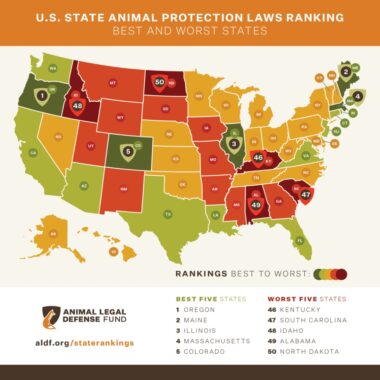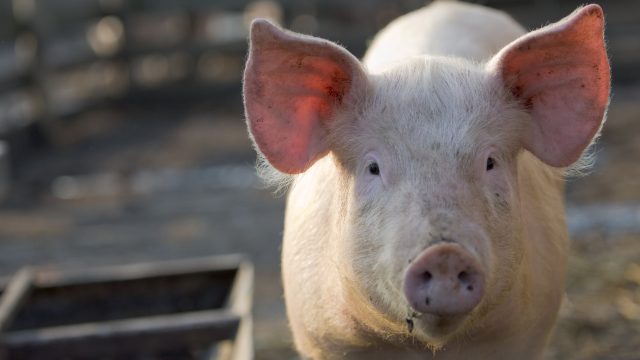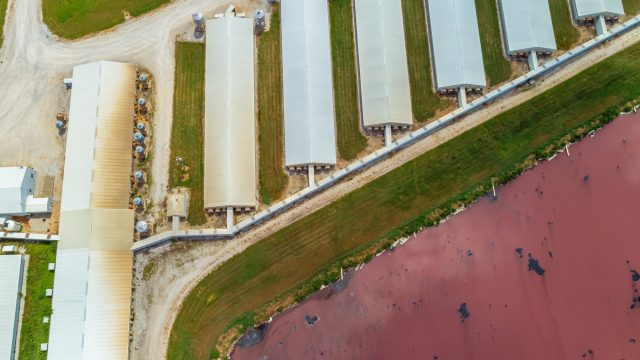
Oregon Ranked Third Best State for Animal Protection Laws
2021 Rankings Report Released: Animal Protection Laws by State
Contact: media@aldf.org
SAN FRANCISCO, CA — For the second year in a row, Maine ranks as the top state for animal protection laws according to the annual U.S. Animal Protection Laws Rankings Report published by the Animal Legal Defense Fund, the nation’s preeminent legal advocacy organization for animals.
The longest-running and most authoritative report of its kind, the 16th annual year-end Rankings Report (2021) assesses the relative strengths and weaknesses of each U.S. state’s and territory’s animal protection laws and ranks them accordingly.
Maine is followed by Illinois (2), Oregon (3), Colorado (4), and Rhode Island (5). New Mexico once again took 50th place, with Idaho (49), Mississippi (48), Alabama (47), and Utah (46) rounding out states with the weakest animal protection laws.
Oregon earned its third-place ranking because state lawmakers have led the way in passing important animal protection measures. For example, the sexual assault of an animal is a sex offense under Oregon law, and the sexual assault statute is adequately defined and addresses related crimes. State law provides for increased penalties for cases involving multiple animals, as well as for repeat animal abusers, repeat domestic violence offenders, and when abuse is committed in the presence of a minor. Protective orders may include animals, pre-conviction forfeiture of animals is allowed, and the law requires mandatory reporting of suspected aggravated animal cruelty by veterinarians. Civilians in Oregon have civil immunity for rescuing animals trapped in unattended vehicles. Even in Oregon there is room for improvement, as the law currently has no felony provision for abandonment, and non-animal-related agencies and departments are not required to report suspected animal cruelty.
Even in Maine there is room for improvement, as post-conviction forfeiture of animals is not mandatory for all animal cruelty crimes, and neither is requiring convicted offenders to pay restitution for the cost of caring for seized animals.
A new trend in 2021 was the enactment and strengthening of veterinary reporting laws and cross-reporting laws. Such laws either require or explicitly permit veterinarians or social service professionals to report suspected animal cruelty. In 2021 four states and one territory enacted veterinary reporting or cross-reporting laws. Another new trend was the enactment of laws addressing certification and training of humane officers. Only 16 states have laws specifying both training standards and enforcement powers for humane officers — laws that are necessary to ensure proper enforcement of animal protection laws. Thankfully that number is trending upward as three states enacted comprehensive humane officer laws in 2021.
“It is vital that we continue to strengthen our animal protection laws as animals are some of the most vulnerable members of society and are too often subjected to cruel mistreatment,” says Animal Legal Defense Fund Executive Director Stephen Wells. “The Animal Legal Defense Fund’s annual Rankings Report helps legislators and advocates identify weak points in their states’ laws — and highlight strong models that can be used to address those weaknesses.”
The rankings are based on a comprehensive review of each jurisdiction’s animal protection laws, including over 3,000 pages of statutes. This is the longest-running and most authoritative report of its kind and tracks which states are taking animal protection seriously.
The full report, including details about each state, is available at www.aldf.org/staterankings.
Sign Up!
Join the Animal Legal Defense Fund's email list to stay up to date on lawsuits, legislation, and regulations affecting animals.
Focus Area
How We Work
Related
-
Court Rules Texas Food Label Censorship Law is Unconstitutional
The law imposed unclear and vague standards on plant-based meat producers that violate the First AmendmentJanuary 29, 2026 Press Release -
State Animal Protection Laws Ranked: Oregon is #1, North Dakota #50
20th edition of ALDF state and territory ranking report highlights major advancements & trends in animal protection across the U.S.January 27, 2026 News -
Over 30 Organizations Urge USDA to Limit Federal Support for Manure Digesters
Hundreds of millions of dollars intended to cut energy costs have been funneled to costly manure digesters, benefitting the largest factory farmsJanuary 15, 2026 News





